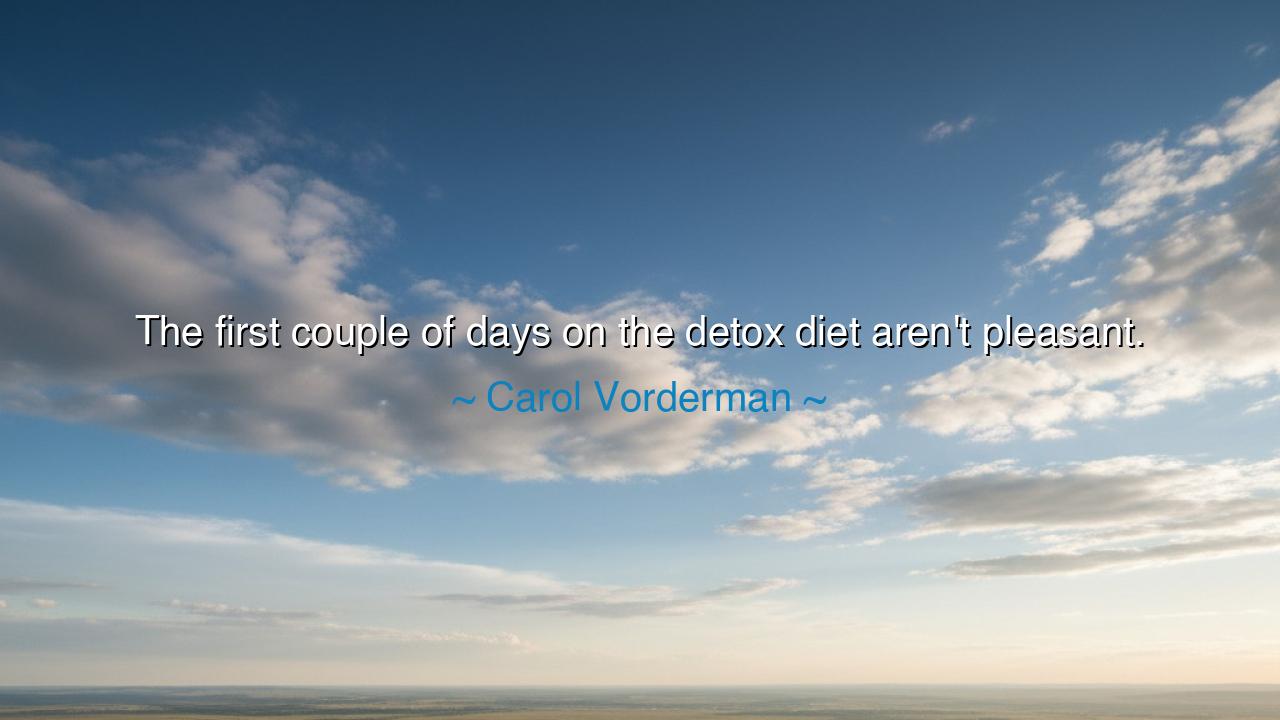
The first couple of days on the detox diet aren't pleasant.






"The first couple of days on the detox diet aren't pleasant." These words, spoken by Carol Vorderman, strike at the very core of the human experience of transformation. They speak to the uncomfortable truth that growth, whether physical or spiritual, often requires us to endure hardship and discomfort. In the process of detoxifying—whether our bodies, minds, or spirits—there is always a period of discomfort before the relief, a phase where the body rejects the very things it has come to rely on. Vorderman’s statement echoes a timeless lesson: that the path to renewal is not without its struggles, but the struggle is the very foundation of transformation.
In the ancient world, great philosophers and healers understood that true healing and growth often began with sacrifice and suffering. Hippocrates, the father of medicine, knew that to restore the body to health, sometimes one had to first cleanse it of harmful substances, whether through diet or other means. He understood that the body must be purified in order to restore balance, but that purification was rarely a painless process. It is the same with Vorderman’s experience: the detox process, while ultimately beneficial, requires patience and endurance through the initial discomfort. It is a process of letting go of the toxins and habits that no longer serve us, allowing the body to recalibrate and find its natural balance.
In the ancient Greek tradition, self-discipline and restraint were seen as vital to achieving virtue and health. Socrates often spoke of the importance of self-control in the pursuit of wisdom and well-being. He taught that the mind and body must be kept in harmony, and to achieve this, one must sometimes endure hardships that purify the spirit. Detoxifying, whether of the body or the mind, often requires us to endure discomfort, much like the philosophical pursuit of truth—a journey that begins with unpleasant realizations and painful reflections, only to end with clarity and understanding. Vorderman’s words echo this ancient wisdom: the difficult start is part of the process, and the discomfort is a necessary stage before enlightenment and renewal.
The Romans, too, understood the concept of purification. The great Cicero often discussed the importance of mental clarity and the way in which our thoughts could be "detoxified" through reason and reflection. Just as we cleanse the body through diet, the Romans believed we could clear our minds through introspection and self-reflection. They saw discomfort as a natural part of this mental purification. Similarly, Vorderman’s detox diet serves as a metaphor for the process of mental and spiritual renewal, where we must push through the initial discomfort in order to emerge stronger and more vibrant.
The story of Hercules and his Twelve Labors offers another powerful example of the difficult path to transformation. Each of the Labors was a test of endurance and strength, requiring Hercules to face great challenges and discomforts. Yet, each hardship he endured brought him closer to his goal of becoming a hero, and each labor was a necessary step toward achieving greatness. Similarly, the discomfort of detoxification is not the end of the journey, but a vital step toward a healthier, more balanced self. Just as Hercules faced his trials with determination, we too must face our personal detox processes with the strength and resolve needed to move through the discomfort and emerge renewed.
The lesson in Vorderman’s words is clear: the path to true health, well-being, and transformation is not one of immediate comfort, but of endurance through initial struggles. Detoxifying our bodies, minds, or spirits may not be pleasant at first, but it is a necessary process for renewal. The discomfort is not a sign of failure, but a mark of progress. It is the body’s way of releasing what no longer serves it, allowing space for something better to take root. Just as the ancient philosophers taught us, we must learn to embrace the challenges, endure the hardships, and trust that the rewards will come when we emerge on the other side.
In practical terms, this means embracing discomfort as part of any process of change. Whether we are embarking on a detox diet, a mental challenge, or a spiritual journey, we must understand that the beginning will often be difficult. But if we persevere, if we continue to move through the discomfort, we will find that the process ultimately leads us to a healthier, more balanced life. Just as Hercules and the great philosophers did before us, we too must embrace the discomfort as a necessary part of our own journey toward wholeness.
Thus, let us remember the wisdom of Carol Vorderman, as well as the timeless lessons passed down from the ancients: that growth and healing require sacrifice, discipline, and endurance. The initial discomfort we face is not the end of the journey, but a necessary step toward transformation. Let us move through our own detoxification processes, whether physical, mental, or spiritual, with the courage and strength of a hero, knowing that on the other side lies a renewed self—stronger, healthier, and more balanced than ever before.






AAdministratorAdministrator
Welcome, honored guests. Please leave a comment, we will respond soon